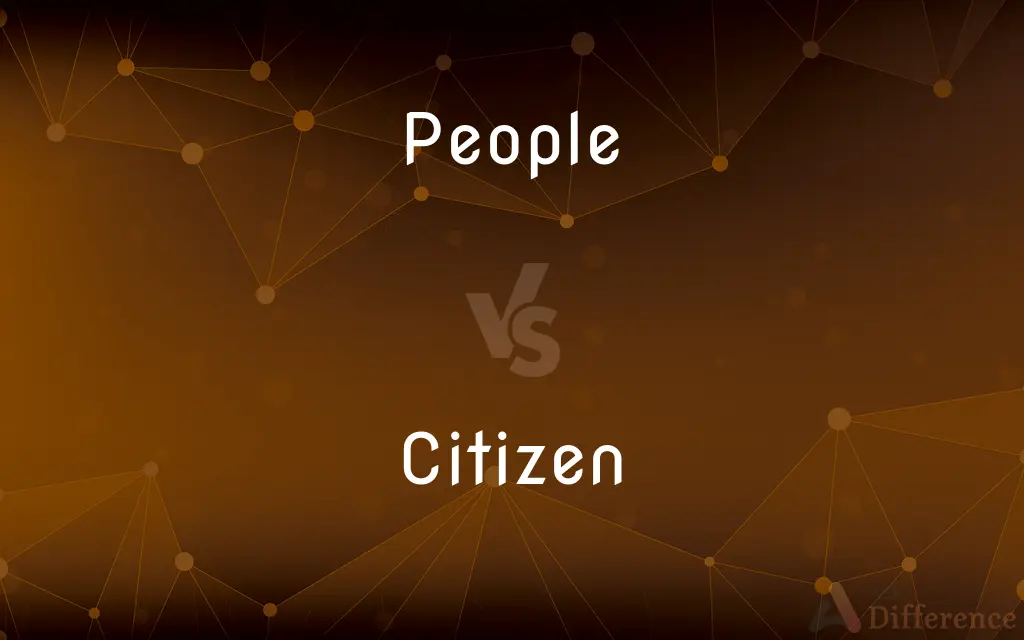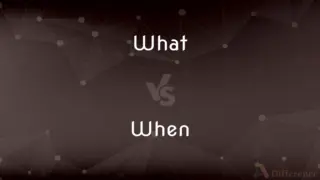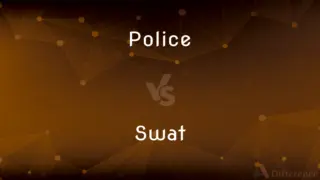People vs. Citizen — What's the Difference?

Difference Between People and Citizen
ADVERTISEMENT
Compare with Definitions
People
A people is a plurality of persons considered as a whole, as is the case with an ethnic group, nation or the public of a polity.
Citizen
A legally recognized subject or national of a state or commonwealth, either native or naturalized
A British citizen
People
Human beings in general or considered collectively
The earthquake killed 30,000 people
People think I'm mad
Citizen
A person owing loyalty to and entitled by birth or naturalization to the protection of a state or nation.
People
The members of a particular nation, community, or ethnic group
The native peoples of Canada
ADVERTISEMENT
Citizen
A resident of a city or town, especially one entitled to vote and enjoy other privileges there.
People
The supporters or employees of a person in a position of power or authority
I've had my people watching the house for some time now
Citizen
A civilian.
People
(of a group of people) inhabit (a place)
An arid mountain region peopled by warring clans
Citizen
A native, inhabitant, or denizen of a particular place
Citizens of rural Utah.
People
Humans considered as a group or in indefinite numbers. Often treated as a plural of person, alone and in compounds
People were dancing in the street. I met all sorts of people. This book is not intended for laypeople.
Citizen
A resident of a city or town, especially one with legally-recognized rights or duties.
People
The mass of ordinary persons; the populace. Used with the
"those who fear and distrust the people, and wish to draw all powers from them into the hands of the higher classes" (Thomas Jefferson).
Citizen
A legally-recognized member of a state, with associated rights and obligations; a person considered in terms of this role.
I am a Roman citizen.
People
A body of persons living in the same country under one national government; a nationality.
Citizen
An inhabitant or occupant: a member of any place.
Diogenes reckoned himself a citizen of the world.
People
The citizens of a political unit, such as a nation or state; the electorate. Used with the.
Citizen
(Christianity) A resident of the heavenly city or later of the kingdom of God: a Christian; a good Christian.
People
Pl. peo·ples A body of persons sharing a common religion, culture, or language
The peoples of central Asia.
Citizen
A civilian, as opposed to a police officer, soldier, or member of some other specialized (usually state) group.
People
Persons with regard to their residence, class, profession, or group
City people.
Farming people.
Citizen
(obsolete) An ordinary person, as opposed to nobles and landed gentry on one side and peasants, craftsmen, and laborers on the other.
People
Persons subordinate to or loyal to a ruler, superior, or employer
The manager would like to introduce you to our people in the regional office.
Citizen
A term of address among French citizens during the French Revolution or towards its supporters elsewhere; dated a term of address among socialists and communists.
People
A person's family, relatives, or ancestors
Where are your people from?.
Citizen
(computing) An object.
People
(Informal) Animals or other beings distinct from humans
Rabbits and squirrels are the furry little people of the woods.
Citizen
One who enjoys the freedom and privileges of a city; a freeman of a city, as distinguished from a foreigner, or one not entitled to its franchises.
That large body of the working men who were not counted as citizens and had not so much as a vote to serve as an anodyne to their stomachs.
People
To settle or inhabit with people; populate.
Citizen
An inhabitant of a city; a townsman.
People
To be present in or on (a place)
"The stores ... are peopled by serious shoppers" (Perri Klass).
Citizen
A person, native or naturalized, of either sex, who owes allegiance to a government, and is entitled to reciprocal protection from it.
People
Used as plural of person; a body of human beings considered generally or collectively; a group of two or more persons.
There were so many people at the restaurant last night.
Citizen
One who is domiciled in a country, and who is a citizen, though neither native nor naturalized, in such a sense that he takes his legal status from such country.
People
(countable) Persons forming or belonging to a particular group, such as a nation, class, ethnic group, country, family, etc.
Citizen
Having the condition or qualities of a citizen, or of citizens; as, a citizen soldiery.
People
A group of persons regarded as being employees, followers, companions or subjects of a ruler.
Citizen
Of or pertaining to the inhabitants of a city; characteristic of citizens; effeminate; luxurious.
I am not well,But not so citizen a wanton asTo seem to die ere sick.
People
One's colleagues or employees.
Citizen
A native or naturalized member of a state or other political community
People
A person's ancestors, relatives or family.
My people lived through the Black Plague and the Thirty Years War.
People
The mass of a community as distinguished from a special class (elite); the commonalty; the populace; the vulgar; the common crowd; the citizens.
People
Plural of person.
People
(transitive) To stock with people or inhabitants; to fill as with people; to populate.
People
(intransitive) To become populous or populated.
People
(transitive) To inhabit; to occupy; to populate.
People
To interact with people; to socialize.
People
The body of persons who compose a community, tribe, nation, or race; an aggregate of individuals forming a whole; a community; a nation.
Unto him shall the gathering of the people be.
The ants are a people not strong.
Before many peoples, and nations, and tongues.
Earth's monarchs are her peoples.
A government of all the people, by all the people, for all the people.
People
Persons, generally; an indefinite number of men and women; folks; population, or part of population; as, country people; - sometimes used as an indefinite subject or verb, like on in French, and man in German; as, people in adversity.
People were tempted to lend by great premiums.
People have lived twenty-four days upon nothing but water.
People
The mass of community as distinguished from a special class; the commonalty; the populace; the vulgar; the common crowd; as, nobles and people.
And strive to gain his pardon from the people.
People
One's ancestors or family; kindred; relations; as, my people were English.
People
To stock with people or inhabitants; to fill as with people; to populate.
As the gay motes that people the sunbeams.
People
(plural) any group of human beings (men or women or children) collectively;
Old people
There were at least 200 people in the audience
People
The body of citizens of a state or country;
The Spanish people
People
The common people generally;
Separate the warriors from the mass
Power to the people
People
Members of a family line;
His people have been farmers for generations
Are your people still alive?
People
Fill with people or supply with inhabitants;
People a room
The government wanted to populate the remote area of the country
People
Make one's home or live in;
She resides officially in Iceland
I live in a 200-year old house
These people inhabited all the islands that are now deserted
The plains are sparsely populated
Share Your Discovery

Previous Comparison
What vs. When
Next Comparison
Police vs. Swat













































